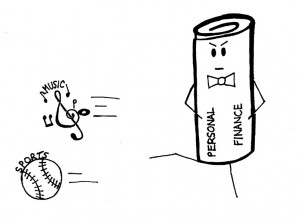Want a high school diploma? Well, if you’re in the class of 2015 or younger, you have a new graduation requirement: a personal finance class.
According to the Virginia Department of Education, the class is intended to “further the development of knowledge, skills, and attitudes needed for responsible citizenship in a constitutional democracy.” But so far, not only has the material failed in this (rather lofty) goal, it has often been a complete waste of busy students’ time.
For example, one county-provided slideshow recently stated that “with goals, you literally create your destiny.” Leaving aside the more pedantic criticisms of that sentence, it makes a fairly obvious point: goals are important. Was it really necessary to create an entire class to teach that?
“Personally, I take [personal finance] online because I would rather take music classes in school than an economics class,” junior Jirius Abdallah said.
But taking the class online requires staying after school whenever there’s a test, and not everyone has the time or transportation to accommodate that schedule.
With the economy still struggling, it’s easy to make grand proclamations: teaching high-schoolers personal finance will help them as adults! But the class has mostly focused on memorizing facts like Japan’s current unemployment rate or the Consumer Price Index in 1975, facts that are only useful if you want to be a global economist, assuming you even remember those facts 5 years (or 5 minutes) after you graduate.
Besides, colleges offer plenty of opportunities to take basic economics classes; there’s no need to force us to take them in high school. Students who want to take an economics class in high school will do so; those of us who don’t want to should be able to make that choice for ourselves.
At the very least, the county should offer a provision for testing out of the class. For example, we recently spent a class period taking a personal finance pre-test. Given that an 80% is generally considered to be proficient, meaning that a student has learned the material satisfactorily, students who score an 80% or higher on this pre-test should be excused from the class. This opportunity could easily be provided online and would save students’ schedule space while easing the overcrowding that sometimes leaves people in my class without the requisite computer to complete classwork.
Overall, the personal finance class has so far been ineffective and hard to accommodate. Making it optional would ease strain on student schedules; let economics teachers create their own, more valuable, lessons; and allow students greater independence in their academics, encouraging them to take charge of their own financial educations.

